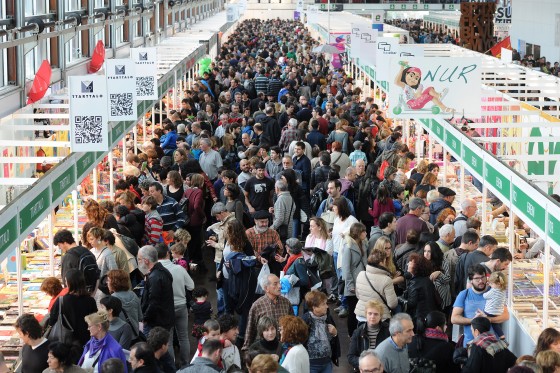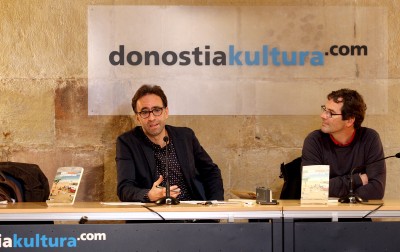“I get the impression that the instruments to promote Basque culture available to Basque society and public institutions are underutilized. If political decisions are not made as a nation and what is being created is not on the radio, or on television, and if they do not feed on each other… it is useless to generate 500 albums and I’m not sure how many books per year. I believe that all albums, books, plays and other cultural creations of the last 15 years have not helped create this shared cultural magma. And it has not been for lack of quality, but because they have not found an appropriate ecosystem.” These are the words of the writer Harkaitz Cano, taken from an interview by journalist Iñigo Astiz in the Basque newspaper Berria, on January 10, 2016. They are words that confirm an idea that is quite accepted in the world of Basque literature over the past years: literary production and the Basque literary industry are solid realities, both in quantity and quality, but are perceived as weaknesses in terms of reception. Clearly put: There is a shortage of readers.

The Azoka (Fair) of Durango, since 1965 is the main annual Basque literary event. Photo: El Diario Vasco
In the analysis of the Basque book industry of 2013, conducted by Joan Mari Torrealdai in the magazine Jakin, data from the twenty-first century is offered, more specifically from the year 2000 to 2013. And this is data about books published in Basque (including both those created in Basque and those translated from other languages; new editions and reprints; literature and other genres…): in the year 2000, 1,519 books; in 2001, 1,488; in 2002, 1,667; in 2003, 1,949; in 2004, 1,859; in 2005, 2,098; in 2006, 1,873; in 2007, 2,173; in 2008, 2,597; in 2009, 2,363; in 2010, 2,111; in 2011, 2,246; in 2012, 2005; and in 2013, 1,822.
With a lack of new data, Torrealdai´s findings demonstrate a downward trend in the edition of new titles. A slow but steady descent from the peak in 2008 (2,597) until 2013, with 1,822 (one of the lowest in the 21st century until now).
When he analyzed the production in 2012 (in Edition 198 of the magazine Jakin), Torrealdai did not say that the decline was due to the economic crisis, but he did share that he was led to this suspicion: The crisis has wiped out many small publishers. In Torrealdai´s words: “Although there are less than during the last years, there are still many editors. The decrease may have been due to the crisis, I don’t know. According to all indications, some small publishers such as associations, municipalities and others have disappeared.”
The Basque Country is among the countries in the world that publishes the most books, as the magazine Sustatu unveiled in November 2014. The production of books in Basque is truly prolific if one takes into account the number of Basque speakers. Considering data from Joan Mari Torrealdai and the annual analysis by the institution International Publishers, Sustatu estimated that only two countries are above the Basque Country in the ratio of publications per million inhabitants: Iceland and the United Kingdom. It is not a very rigorous or scientific comparison, but it may be enough to ensure that the publication of new books in Basque is fruitful and the slight decline in recent years has no particular meaning.

The school text book is one of the pillars of the Basque book industry. Photo: El Diario Vasco
More than because of this drop in production, in his analysis in number 198 of Jakin, Torrealdai shows greater concern for the growing hegemony of “external” publishers; Torreladai refers to “those that are headquartered outside the Basque Country”: Santillana-Zubia, Anaya-Haritza, Edelvives-Ibaizabal, Edebe-Giltza… Books from these publishers accounted for 38% of the total production in 2012. But when it comes to literature for children and youth, it reached 46.5%. And in books of school matter, over half, 66%. In Torrealdai´s opinion, it is “unusual, but perhaps not too surprising of an indication.”
The “Short Wings” of Digital Edition
In regards to digital edition of books, in his analysis of 2013, Torrealdai writes that the “long flight” that was predicted in its day has been postponed and that it still has “short wings” to do so. Here is the data that he provides: in 2009, 214 titles; in 2010, 227; in 2011, 163; in 2012, 103; and in 2013, 126. “Apparently, neither publishers nor universities appreciate the conditions necessary to opt for this format,” Torrealdai opinionates.
Regardless, during recent years there has been standardized digital versions of books published on paper, since the majority of publishers in the field of literature do offer such versions. Most publishers offer prices of their digital versions not much lower than their paper versions. The publishing house Susa, however, offers the possibility of downloading digital versions for €3.63. The volume of sales of these digital versions is still well below their paper versions.
Without Significant Declines in Poetry and Narrative
Lists of books in Basque composed by the magazine Egan and by Olerti Etxea (House of Poetry) of Zarautz are not as precise and comprehensive as Torrealdai’s, but serve to provide another set of data related to literary production. For example, analyzing such listings, we can observe that in the most consistent publishers of literature created in Basque (Alberdania, Elkar, Erein, Maiatz, Pamiela, Susa, Txalaparta and Utriusque Vasconiae) there are no declines nor significant increases over the past years: in 2000, 28; in 2001, 27; in 2002, 30; in 2003, 33; in 2004, 39; in 2005, 42; in 2006, 39; in 2007, 35; in 2008, 42; in 2009, 43; in 2010, 33; in 2011, 40; in 2012, 44; in 2013, 34; in 2014, 40; and in 2015, 41.

Writer Harkaitz Cano presents his latest book of short stories in San Sebastian. Photo: El Diario Vasco
We must emphasize, however, that one of these publishers, Alberdania, has not published any new books since 2012, and it doesn’t seem that they ever will again. Some smaller publishers have also ceased to publish books. On the other hand, some small, independent publishers like Edo! have been created.
Therefore, the problem, at least for the time being, is not in the numbers, because there is wide and varied production; in opinion of experts, and literary critics, there is no problem in the quality of what has been published. The problem, using Harkaitz Cano’s own words, is that what is published is “underutilized”, in that it is not an instrument to create a “shared cultural magma”, since it has not found a suitable “ecosystem”.
Anyway, this diagnosis comes from long ago and has still not found a proper prescription; and if there is one, it has not been applied to the illness; and if it has been used, it hasn’t worked; and if it is working, we are not aware of it.


Even American publishers are interested in publishing book in Eusara